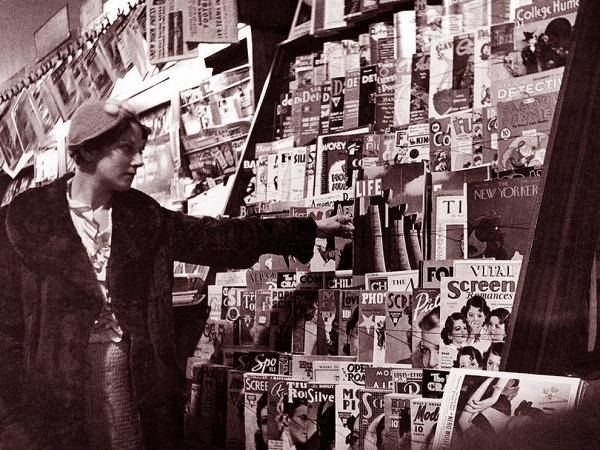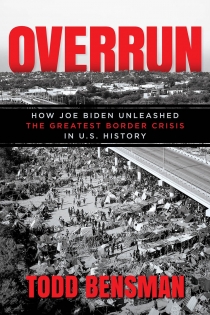Recently Added ArticlesClick here to be notified when articles
are added to your favorite categories 
- from Amazon:
 James Beard on Cheese (Gentry Magazine, 1957)
"It can be soft, hard, sweet, sour, hot, cold, pungent or bland.
It comes in various shapes and many colors.
It can be inodorous or effuvious.
It is known in every country, to every tongue."
"Whatever its shape, hue, scent or nationality it is one of the most ancient,
most honorable of foods and it is called cheese."
A wise man once said "A Meal Without Cheese is Like a Beautiful Woman with One Eye".
Deported From Ellis Island (Literary Digest, 1937)
Here is a 1937 article concerning those stout souls who thought they'd make their way into the United States illegally - but made it no further than Ellis Island:
"Aliens who have sneaked into the country are, by the fact of their entry, lawbreakers... Out of gratitude to a country which has welcomed them, is it too much to ask the properly qualified alien to register, in order that his fraudulent countrymen me be detected and sent home?""
Why Is God So Silent? (Jesus People, 1973)
Frederic W. Farrar (1831 - 1903), Dean of Canterbury Cathedral during the last eight years of the Victorian era saw fit to examine God's silence and seeming indifference while humanity struggles:
"God makes no ado. He does not defend Himself. He suffers men to blaspheme. His enemies make a murmuring but he refrains. And much of what is said is awfully true - for those who utter it. To men, to nations, God is silent; there is no God. Their ears are closed so that they cannot hear. They who love the darkness have it. To those who will not listen, God does not speak."
''Death Camp for Children'' (PM Tabloid, 1945)
As if Auschwitz, Dachau, Buchenwald, Nordhausen and Bergen-Belsen weren't bad enough - in late April, 1945, advancing Soviet infantry reported that:
"The Red Army had found a concentration camp for children at Konstantinov, beyond Lodz in central Poland...There were 862 children in the camp, all Russian, White Russian and Ukrainian."
This Guy Coached Astaire and Rogers (Literary Digest, 1936)
A magazine profile of RKO Studio Dance Director Hermes Pan (1909 - 1990); his work with Fred Astaire (1899 – 1987) and Ginger Rogers (1911 – 1995) and the lasting impression that African-American dance had made upon him. It is fascinating to learn what was involved in the making of an Astaire/Rogers musical and to further learn that even Bill "Bojangles" Robinson (1878 - 1949) was a fan of the dance team. "Astaire liked the youngster's blunt answers. He realized the need of a critic who would talk back to a star."
The New Objectivity (Current Opinion, 1919)
A review of the paintings and sculptures from the Weimer Republic and the manner in which that new art served to reflect the social upheaval that was taking place in Germany at that time. The article concerns itself primarily with one art exhibit in particular, the Spring Exhibition of the Berlin Secession (1919) and the two art factions who participated: there were the artists of "Der Sturm" a movement that existed prior to the war and a newer, post-war tribe; the "November Group". Also displayed were the works of two painters who served in the Kaiser's army and did not return; Franz Marc (1880-1916) and August Macke (1887-1914)."It is hoped by the German Expressionists and the artists of the "New Objectivity" that their art will serve as a tool for the destruction of Germany's old order."
Click here to read about Expressionist woodcuts.
The New Objectivity held up a mirror to the political crises that was playing out all over Germany, click here to read about it...
The Search for an Honorable Exit (Pageant Magazine, 1970)
Using a public forum, retired U.S. Air Force General Edward Lansdale (1908 – 1987) proposed a plan for the withdrawal of American and Allied Forces from Vietnam - a plan that came to be known as "Vietnamization".
The Jokes of Abraham Lincoln (Pageant Magazine, 1954)
"Lincoln could use humor as an explosive weapon as well as employing it as a constructive force... For Abraham Lincoln never told a story except with a purpose. He himself pointed this out often. His anecdotes were the precision tools of a highly skilled and intelligent wit... 'I laugh because I must not cry: That's all, that's all.'"
Click here to read another article about Lincoln's use of humor and story-telling.
Click here to read the back-story concerning the Star-Spangled Banner...
Arab Population Growth as Israel is Reborn (PM Tabloid, 1945)
"It is in Palestine where the Jews are building a national home, that the Arab enjoys higher standards of living and of health than anywhere in the Middle East... The Arab population of Palestine has risen from 600,000 to 1,200,00."
Abraham Lincoln: The Boy (National Park Service, 1956)
Following the death of his mother, Nancy Hanks, the future president was but six years old. Lincoln's father, Thomas Lincoln, then married Sarah Bush and the family moved to Indiana. The Lincoln family was poor and suffered hardships living in the Indiana wilderness but a bond was created between stepmother Sarah and the boy Abraham that was never broken. From the age of nine and throughout the rest of his life Lincoln would call her, "Mother".
These are the tender memories of his boyhood that she called to mind just five months after the assassination.
|
Did You Not See Your Search Article
On This Page?
The Subject You Are Seeking Is On This Site,
It Has Simply Been Removed From This Page.
Please Use This Search Engine To Locate It.
|